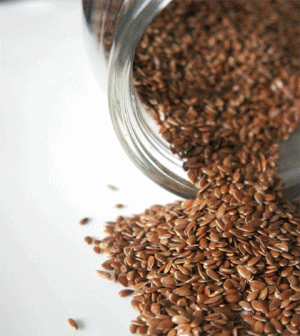- Finding Unshakable Power in a World That Wants to Pull Us ApartPosted 2 weeks ago
- What could a Donald Trump presidency mean for abortion rights?Posted 2 weeks ago
- Financial Empowerment: The Game-Changer for Women in Relationships and BeyondPosted 2 months ago
- Mental Health and Wellbeing Tips During and After PregnancyPosted 2 months ago
- Fall Renewal: Step outside your Comfort Zone & Experience Vibrant ChangePosted 2 months ago
- Women Entrepreneurs Need Support SystemsPosted 2 months ago
The Benefits of Flaxseed: From Cholesterol to Cancer Prevention

By Gina-Marie Cheeseman | Naturallysavvy.com
First cultivated in Babylon about 3,000 BC, the benefits of flaxseeds have been touted through out history. King Charlemagne in the 8th century passed laws requiring his subjects to consume them because he strongly believed in flaxseed’s health benefits. Why all the hype about flaxseed?
Flaxseed contains omega-3 fatty acids, which are essential fatty acids not made in our bodies, so we must get them from food sources. Each tablespoon of ground flaxseed has about 1.8 grams of lignans, which have both plant estrogen and antioxidant qualities. Flaxseed contains 75 to 800 times more lignans than other plant foods. In addition, flaxseed contains both soluble and insoluble fiber.
Several studies indicate that King Charlemagne’s faith in the health benefits of flaxseed may not have been displaced. The studies suggest that flaxseed provides a whole slew of health benefits, including preventing cancer and lowering cholesterol.
Preventing cancer
A French study analyzed the association between consuming plant lignans and reducing the risk of postmenopausal invasive breast cancer. Researchers included 58,049 postmenopausal French women in the study, and found that those consuming the most lignans had a reduced risk of breast cancer. They concluded that “high dietary intakes of plant lignans and high exposure to enterolignans were associated with reduced risks of ER- and PR-positive postmenopausal breast cancer in a Western population that does not consume a diet rich in soy.”
Researchers at the University of Texas M. D. Anderson Cancer Center analyzed the effects of flaxseed-supplemented diets on the biology of the prostate. Prostate cancer patients were given low-fat, flaxseed supplemented diets. The researchers concluded that flaxseed “may be protective for prostate cancer.”
Read more about natural cancer prevention
Lowering cholesterol
A Canadian study on rabbits fed supplements with secoisolariciresinol diglucoside (SDG), a plant lignan isolated from flaxseed, found that SDG reduced bad cholesterol (LDLs) and increased good cholesterol (HDLs). Chinese researchers analyzed 28 studies on flaxseed and its effects on blood lipid profiles in adults, and found “flaxseed significantly circulating total and LDL-cholesterol concentrations.”
Read more about lowering cholesterol
The Best Form of Flaxseed
WebMD recommends ground flaxseed, also called milled or flaxseed meal, as the best choice because flax oil only contains part of the seed. The recommended dose is one to two tablespoons of ground flaxseed a day. The best way to take ground flaxseed is to add it to a food you usually eat. For instance, if you eat plain yogurt every morning, add 1 or 2 tablespoons. You can also use flaxseed in baking. Substitute ground flaxseed for part of the flour in recipes for quick breads, muffins, rolls, pancakes, and waffles. Try replacing 1/4 to 1/2 cup of the flour with ground flaxseed if the recipe calls for two or more cups of flour. The freezer is the best place to store ground flaxseed.






